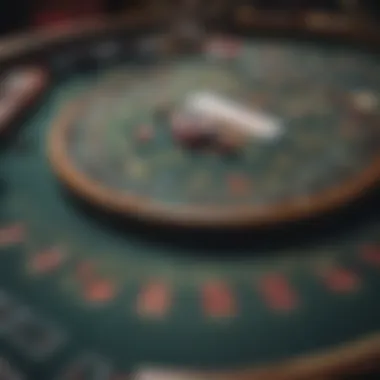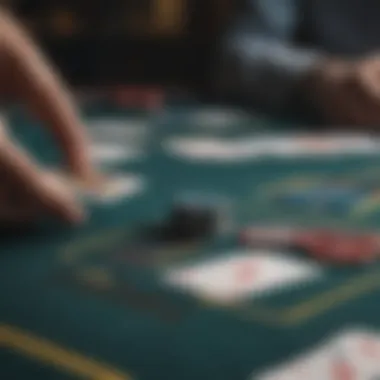Strategies and Insights into the World of Blackjack


Intro
Blackjack has long captivated the minds of gamblers, its simple rules belied by a depth that can easily draw in both novices and veterans alike. At its core, blackjack marries chance with strategy, prompting players to not just rely on the luck of the draw but to also engage in thoughtful decision-making. Exploring this game reveals a labyrinth of tactics, nuances, and psychological theories that have evolved alongside the game itself.
In this piece, we’ll dissect various aspects of blackjack, shining a light on current trends in the gambling world, innovative strategies that have emerged, and insights from seasoned players. This exploration will delve into how the game has morphed through history, particularly in the rise of online platforms, reminding players that understanding the nuances of blackjack can very well be the key to hitting that elusive 21.
Let’s initiate our journey by diving into Game Analysis, providing foundational knowledge that can prove beneficial regardless of one's experience level.
Understanding Blackjack
In the realm of gambling, understanding blackjack goes beyond just knowing how to play it; it opens a door to strategy, history, and an appreciation of a game that has evolved over centuries. It’s a game that blends luck with skill, where the decisions you make can tip the odds in your favor. This foundational understanding is crucial for anyone stepping into a casino or engaging in online play. Grasping the core mechanics gives players an edge, allowing them to navigate through various strategies effectively.
Historical Context of Blackjack
The origins of blackjack are as intriguing as the game itself. Although widely believed to trace its roots back to French casinos during the 1700s, known then as "Vingt-et-Un" (Twenty-One), it has traveled through time, evolving along the way. The game made its way to the United States through European immigrants, gaining popularity in American casinos.
In the early 1900s, the rules started to solidify, and casinos began offering bonuses to attract players. For instance, if a player received a blackjack—an Ace and a ten-value card—they would receive 1.5 times their bet. This incentive, alongside rising casino culture in places like Las Vegas, paved a path that cemented blackjack as a staple in both physical and online gambling. The historical lens not only enriches the player’s experience but also informs modern strategies developed in response to evolving rules and player behaviors.
Basic Rules and Mechanics
At its core, blackjack is fairly straightforward, but grasping the basic rules is essential for both novice and seasoned players. The main objective is to have a hand value closer to 21 than the dealer's hand without exceeding it. Here are the fundamentals:
- Each player starts with two cards, and the dealer has one card face up and one face down.
- Players can ‘hit’ (take another card) or ‘stand’ (keep their current hand).
- Hands are valued based on the cards; numbered cards are worth their face value, Aces can be worth either 1 or 11, and face cards are worth 10.
Understanding these mechanics is crucial as they form the basis for more complex strategies and decisions at the table. Players must also be aware of specific rules such as splitting pairs or doubling down, which can significantly alter the odds in their favor.
Card Values and Scoring System
Knowing how to calculate the value of your hand is vital. Each card plays a role in determining your score, and being mindful of how they interact with the dealer’s visible card can shape your gameplay. Here’s a simple breakdown:
- Aces: Can be counted as 1 or 11, depending on what benefits your hand most.
- Numbered Cards (2-10): Worth their face value.
- Face Cards (Jacks, Queens, Kings): Always valued at 10.
For example, if you have Ace-8, your hand can be either 9 or 19. This flexibility can influence whether you hit or stand. The dealer must follow strict rules on how to play their hand, typically standing on 17 or higher. Understanding the card values allows players to make informed decisions, enhancing their chances of outsmarting the dealer.
"In blackjack, every decision counts. Understanding the rules and mechanical aspects of the game can set the stage for strategic success."
As players become familiar with these foundational elements, they're better equipped to dive into the more advanced strategies discussed later in the article.
Strategic Approaches to Blackjack
In the highly competitive environment of blackjack, adopting effective strategic approaches is crucial. Players who leverage sophisticated strategies can significantly increase their winning odds while simultaneously making the game more enjoyable. Understanding the nuances of various techniques not only equips players with the necessary tools to excel but also fosters a deeper appreciation for the game itself.
Basic Strategy Explained
At its core, basic strategy serves as the backbone for a successful blackjack game. This systematic approach relies on the player’s hand value and the dealer’s visible card to dictate optimal actions—whether to hit, stand, double down, or split.
A player can follow a strategy chart designed to offer specific moves in a multitude of scenarios. For example, if you hold a total of 16 against a dealer’s 10, the basic strategy suggests to surrender, if allowed, or hit. It sounds simple, right? But adhering to basic strategy can lower the house edge to as little as 0.5%.


Some critical points include:
- Always doubling down on 11: This is often recommended, as the chances of landing a strong hand are favorable.
- Standing on a 17 or higher: While tempting to hit, this can bungle a lead.
- Splitting Aces and eights: This can create stronger hands, maximizing potential payoff.
"Mastering basic strategy is akin to mastering the rules of chess before devising intricate maneuvers. It's foundational."
Card Counting Techniques
Card counting, a method often romanticized in popular culture, involves tracking the ratio of high to low cards dealt from the shoe. Unlike basic strategy, which focuses on statistical decisions, counting requires a player to keep a mental tally. This practice can swing the odds in favor of the player when executed properly.
Among the various counting systems, the Hi-Lo method stands out due to its simplicity and effectiveness. Players assign values to cards—low cards (2-6) are given a value of +1, neutral cards (7-9) are worth 0, and high cards (10-Ace) are -1. By maintaining a running count, players can adjust their bets and playing decisions based on this count.
Here's a snapshot of how it works:
- Start with a count of zero at the beginning of the shoe.
- Add or subtract based on the cards that get played.
- Adjust your betting strategy: A higher positive count prompts larger bets, as the player has the advantage.
While this technique is no silver bullet and does not guarantee wins, it places the odds in the player’s favor when done correctly.
Advanced Betting Strategies
Once the basic strategies are mastered, players can delve into advanced betting strategies to further enhance their gameplay. These strategies often involve intricate adjustments based on betting patterns, game flow, and table dynamics.
One noteworthy strategy is the Martingale System, which involves doubling your bet after each loss. This method aims to recoup losses once you eventually win. However, it does come with risks; a losing streak can lead to significant financial depletion before a win turns things around.
Another interesting approach is the Paroli System, which works oppositely to Martingale. Here, players increase their bets after each win, attempting to maximize profits during a winning streak while limiting losses during downturns.
Key considerations when implementing these advanced strategies include:
- Set a loss limit: Knowing when to walk away is crucial to prevent emotional decisions.
- Stay aware of table limits: This can cap how far one can push the betting in systems like Martingale.
- Adaptability: Adjust strategies based on the situation; rigidity can often lead to mistakes and missed opportunities.
Understanding these advanced strategies not only enhances gameplay but also offers players insight into the psychological dance between risk and reward at the blackjack table.
Psychological Aspects of Playing Blackjack
Understanding the psychological aspects of playing blackjack is critical for anyone looking to excel in the game. Unlike many casino games that are purely chance-based, blackjack requires a blend of skill, strategy, and emotional intelligence. This section dives into two specific areas – player behavior and emotional management – both of which can significantly alter the outcome of a session.
Understanding Player Behavior
The actions of players at the blackjack table can often speak volumes about their personal tendencies and psychological state. Buccaneers of luck and opportunity, players bring their own unique behaviors, which can influence their own decisions as well as those of their fellow gamblers. There are several psychological factors at play:
- Risk Tolerance: Each player has a different threshold for risk. Some might bet high on a hunch, whereas others play conservatively. Understanding where you fall on this spectrum can guide your gameplay choices.
- Social Dynamics: The camaraderie often found at a blackjack table can create a pressure cooker environment. Observing how other players behave can shift one's strategy. For example, if a player is having a lucky streak, it may inspire others to increase their bets.
- Cognitive Biases: Understanding common biases, such as the gambler's fallacy – the notion that past trends will predict future outcomes – is crucial. Players must recognize these biases in themselves to avoid poor decision-making during play.
"Player's intuition can sometimes lead them astray, driven by emotion rather than solid strategy."
Awareness of these behaviors can foster better strategies, allowing players to tailor their approach based on not only their hand but also the dynamics of the table.
Managing Emotions at the Table


The ability to manage one's emotions is a pivotal skill in blackjack, especially in high-stakes environments where every decision can lead to significant wins or losses. Emotions like excitement, frustration, and even fatigue can cloud judgment and lead to mistakes. Here are some strategies for better emotional control:
- Practice Mindfulness: Engaging in mindfulness techniques can help ground players, allowing them to acknowledge their feelings without letting them dictate their actions. Simple breathing exercises or a brief mental check-in after each hand might help keep feelings in check.
- Set Limits: Before sitting down, it's wise for players to establish both win and loss limits. Knowing when to walk away can help prevent emotional play, which often leads to chasing losses.
- Stay Flexible: Adopting a flexible mindset can help players adapt their strategies in real-time without becoming anchored to previous outcomes, whether good or bad. This adaptability ensures that emotions do not drive decision-making.
- Take Breaks: When the emotional temperature at the table rises, it's critical to recognize when to take a step back. A few minutes outside can provide perspective, helping reset the emotional compass.
To sum it up, understanding player behavior and managing emotions are two fundamental pieces of the psychological puzzle in blackjack. They create a framework within which players can operate effectively, keeping them grounded amid the fluctuating tides of blackjack's allure.
The Evolution of Online Blackjack
The evolution of online blackjack marks a turning point in the casino landscape, merging traditional table gaming with modern technology. As this genre adapts and expands, it draws a plethora of players into the virtual realm. For both seasoned players and newcomers, understanding the trajectory of online blackjack opens up not just a world of opportunities but also a comprehensive appreciation for how this classic game has transformed.
Rise of Online Gambling Platforms
In the past two decades, online gambling platforms have mushroomed, reshaping the way players indulge in blackjack and other casino games. The advent of the internet paved the way for casinos to shift from physical locations to digital formats, making games more accessible than ever before.
- Convenience: Players can access games from the cozy corners of their homes or while on the go. No need to dress up or worry about travel arrangements.
- Diverse Choices: Online platforms offer a staggering variety of blackjack games, from traditional variants to more creative takes that you might not find in land-based casinos.
- Bonuses and Promotions: Online casinos often roll out attractive bonuses and promotions aimed at new and existing players. This can range from welcome bonuses to loyalty programs that keep players returning for more.
Yet, this rise isn't without its challenges. Issues surrounding responsible gambling and security have emerged, prompting both players and regulators to tread carefully.
Current Trends in the Blackjack Scene
The blackjack landscape is continually evolving, reflecting shifts in player preferences, technological advancements, and regulatory frameworks. Understanding current trends in the blackjack scene is crucial for both players and casinos alike. The choices players make today are influenced by various factors, such as game variants, innovative gameplay features, and the regulatory environment that governs these choices. Keeping up with these trends not only enhances the player experience but also provides insights into potential future developments in the game.
Popular Variants of Blackjack
Blackjack has myriad variants that cater to different tastes and strategies. These variations often introduce unique rules or modifiers that can significantly alter the game dynamics, thus attracting a broader audience.
- Spanish 21: This variant removes the tens from the deck but offers bonus payouts for certain hands, creating new strategic opportunities.
- Blackjack Switch: Players can switch the second cards of two hands for better totals, adding an element of skill.
- Double Exposure: Both dealer cards are dealt face up, providing players more information but also reduces the payout for a natural blackjack.
These variants not only spice up the gaming tables but also prompt seasoned players to adapt their strategies. The increase in available options means casinos can appeal to a wider range of customers, making blackjack more accessible and entertaining.
Innovative Game Features
The introduction of innovative features is reshaping how blackjack is played. Technological advancements have opened doors to experiences that were unimaginable a decade ago.
- Side Bets: These additional wagers allow players to bet on outcomes beyond the basic game, offering greater earning potential.
- Progressive Jackpots: Often linked to side bets, these can grow to hefty payouts, making the game more thrilling.
- Virtual Reality Tables: With advancements in technology, some casinos are offering immersive virtual reality experiences, allowing players to engage with the game in an entirely new way.
These game features not only enrich the player experience but also create new strategies and opportunities for engaging with the game. The appeal of trying unique formats can elevate a player's status amongst peers, fostering a sense of community around shared experiences.
Regulatory Changes Impacting Play
Regulatory changes always play a critical role in shaping the gambling scene. As governments adapt to new technologies and societal attitudes, the rules surrounding blackjack can shift significantly.
"Regulations can either bolster player trust or diminish the excitement of the game depending on their implementation."
- Increased Oversight: Many jurisdictions are implementing stricter oversight of online gambling platforms to ensure fair play, affecting how casinos offer blackjack.
- Territorial Laws: Variations in state or national laws can impact the availability of certain blackjack games or features.
- Responsible Gambling Initiatives: New measures aim to promote responsible gaming practices, which might limit wagering amounts or the number of hands played at once.
By staying informed about these trends, players can better navigate the game’s evolving landscape while ensuring they remain compliant with existing regulations.


Learning from Expert Players
Becoming a proficient blackjack player often means absorbing wisdom from those who’ve been in the trenches. Learning from expert players is crucial, as it shines a light on various dimensions of the game that may go unnoticed by casual players. Expert insights can encompass advanced strategies, psychological tactics, and even tips on maintaining composure. The nuances shared by seasoned gamblers can sharpen a player's skills significantly, and in a game where every decision counts, such knowledge is invaluable.
Interview with Professional Players
When delving into the minds of professional players, it becomes evident that their journey in blackjack is often riddled with both triumph and tribulation. Taking time to interview experienced players can yield fascinating insights about their approach to the game. For instance, one might ask why they chose to focus on card counting or how variance has shaped their betting strategies.
Many professionals emphasize the importance of discipline and patience. As one player put it, "Understanding when to walk away is as critical as knowing when to hit or stand." The psychological aspect of this game cannot be stressed enough. Often, it's not just about the cards but about reading opponents and managing one's own emotional landscape.
To cultivate deeper understanding, consider these key takeaways from professional insights:
- Discipline: Strong players stick to their strategies, regardless of short-term outcomes.
- Adaptability: Flexibility is vital when approaching different table dynamics and player behaviors.
- Continuous Learning: Even the top players are always evolving in their strategies, taking note of shifting trends and game variants.
Common Mistakes and How to Avoid Them
Mistakes abound in blackjack, especially for those who think they can wing it. By identifying common pitfalls, players can bolster their game significantly. Some prevalent errors include over-betting during a winning streak or tilting after a string of losses. These mistakes can spiral quickly, affecting not just the wallet, but also the mental game.
Awareness of these issues is the first step towards improvement. Here are some common traps to avoid:
- Ignoring the Basic Strategy: Basics are basics for a reason. Straying from them can lead to hasty decisions.
- Chasing Losses: This can create a vicious cycle, making players more vulnerable to further losses. Stepping away is sometimes the best move.
- Playing Too Many Hands: Taking on more than one hand at a time can dilute focus and increase the risk of misplays.
Another common blunder is misunderstanding the value of table position. Many novice players underestimate how much the seating arrangement can impact their gameplay. Familiarizing oneself with this can provide a strategic edge over less aware opponents.
Incorporating lessons from expert players not only enriches one's approach to blackjack but also fosters a more profound respect for the game. Analyzing their strategies, understanding their errors, and holding onto their insights can bridge the gap between novice and expert, opening pathways to not only improved play but also a richer engagement with the gambling experience.
Future Outlook of Blackjack
Looking ahead in the world of blackjack, it’s vital to grasp how numerous elements will shape the future of this beloved card game. Understanding the potential shifts in gameplay, regulatory landscapes, and cultural relevance can significantly enhance players' tactical approaches and overall experiences. By exploring these areas, players can better prepare themselves for the evolving dynamics of blackjack.
Technological Advancements in Gameplay
Technological innovation is fundamentally transforming how blackjack is played. For instance, artificial intelligence and machine learning are making their way into online platforms, helping to personalize the gaming experience for players. These technologies analyze player behavior and adapt offerings in real-time, thus improving player engagement.
Moreover, advancements in virtual reality mean that players could soon find themselves at a table with a lifelike dealer, all from the comfort of their living room. Imagine standing at a real blackjack table, interacting with other players and the croupier as if you were in a traditional casino, without stepping foot outside.
"As gambling technology progresses, so does the skill set required to excel at blackjack. Players must stay informed and adapt to these changes to maintain their edge."
There’s also the rise of mobile gaming. With more people accessing games through their smartphones or tablets, game developers have started prioritizing mobile-friendly formats. New user interfaces designed specifically for smaller screens allow for seamless gameplay, logs for tracking gameplay, and features like touch interactivity, which can engage players more deeply.
Potential Changes in Casino Regulations
The regulatory environment surrounding blackjack and gambling as a whole is under constant scrutiny and is expected to evolve. As online gambling gains momentum, jurisdictions around the globe are considering stricter regulations to ensure fair play and prevent fraud, which could lead to more transparent gameplay for players.
Potential regulatory changes may also affect payout ratios and house edges, changing the fundamental dynamics of the game. For example, should regulations shift to favor players in a bid to attract more participants to the gambling scene, blackjack tables might become increasingly appealing for new and seasoned players alike.
Additionally, the concept of responsible gambling is becoming more prominent, with many casinos implementing limits to protect players from excessive losses. Balancing regulation with player freedoms will be a crucial conversation in forward-thinking gambling legislation.
The Role of Blackjack in Modern Gambling Culture
Blackjack has solidified its place as a cultural touchstone within the gambling universe. Its appeal spans various demographics, giving it a unique position in modern gambling culture. As nostalgia intertwines with modernity, we see younger players drawn to the game through classic films and literature, which continue to romanticize the high-stakes lifestyle associated with blackjack.
As new generations embrace the game, so too does innovation in how it’s presented. Social casinos and gamified experiences are starting to integrate into traditional blackjack formats, making the game more appealing to casual players, not just die-hard enthusiasts. This shift could lead to a broader acceptance and understanding of blackjack as a social pastime, rather than merely a gambling endeavor.
By staying informed and adaptable, players can better navigate the changing landscape, ensuring that they not only survive but thrive in the exuberant world of blackjack.



